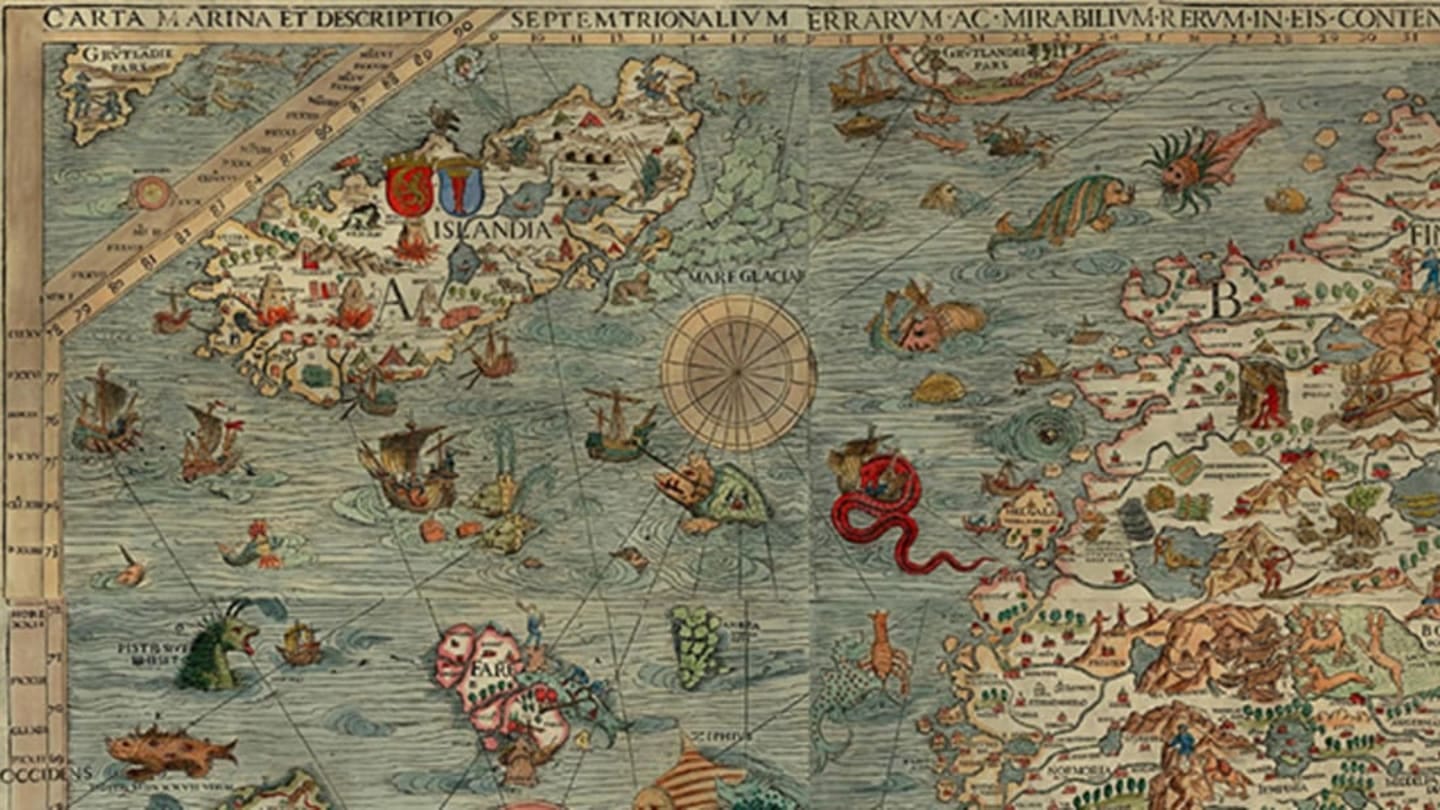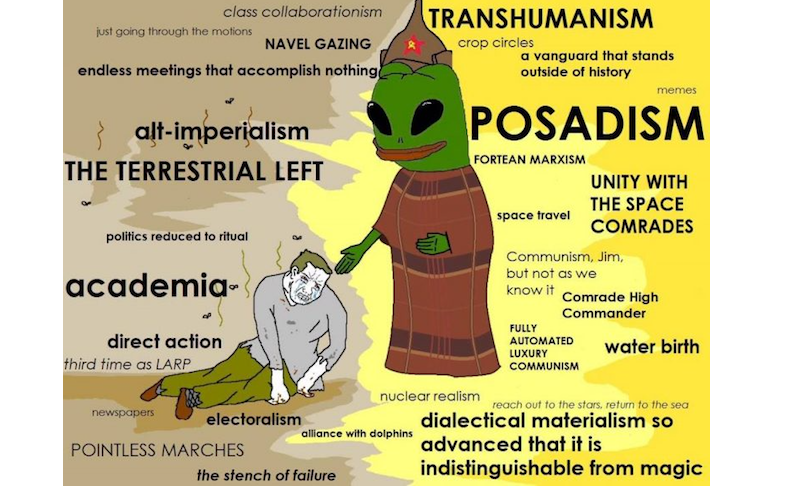We're Back! A Paranoid's Story [Trenchant Edges]
Estimated reading time: 10 minutes, 9 seconds. Contains 2031 words
Welcome back to the Trenchant Edges, a newsletter that actually exists I promise.
I’m your MC, Stephen.
This is a newsletter about the tension between skepticism and the limits of knowledge and belief. Between the lure of forbidden knowledge and the truth. About options for resistance and failed alternatives.
To put it another way, for people who think Eve was right to eat the fruit of the tree of knowledge and don’t give a fuck about the subsequent drug bust.
The name takes inspiration from those old medieval maps which teach us an important lesson about the human mind.
Here Be Monsters.
It’s not really a bad survival mechanism if you’re living out in nature. Anxiety about the monster under your bed makes a lot more sense when there could be predators just out of sight.
Anxiety means increased focus and if you really did hear something that’s valuable seconds your body doesn’t need to shift gears into snap action if needed.
But as civilization rationalizes ever-more natural spaces as industrialization and colonialization have expanded around the world over the last 500 years. Media technologies created a larger sense of a “public” than was possible before print.
Rumor as a service. Cheap, easy, convenient.
With the rise of a public came more coherent mainstream, made even more obvious with time and additional medias. Radio, TV, Cable, The Internet, Social Media, Cell Phones.
Now we’re all plugged into a global village with just as much gossip as any other small town.
And while all this technology has reshaped our minds and relationships, social revolution after social revolution has reshaped who holds power in society and how they wield it.
Those medias all consolidated into fewer and fewer hands. Here’s a hilariously outdated chart from 2018 that’s the least bad one I could find:

The idea of a “free and independent press” at a national scale is, in short, in a grim state.
This newsletter isn’t really about any of that, it’s about people who push back against all that. Those responses have ranged from general complaining (my favorite!) to acts of would-be revolutionary terrorism.
In the past I’ve tried to run this newsletter a couple different ways: First was supposed to be tightly focused on specific topics. Terence McKenna’s Timewave theory, Marshall Mcluhan’s Media analysis.
Then I just kind of rambled about whatever interested me on and off for a year or so.
And now we’re here with me trying to decide what this newsletter is going to be going forward.
I figure the best way to do that is to lean into the writing & research itself. We’re going to do another month or so of me writing a *lot* more. Another change is I no longer feel any compunction about writing directly about politics.
So let’s get some basics out of the way there: I’m a communist. I believe everyone’s basic needs should be addressed and provided for.
Now, I’m a weird communist. I don’t really give a shit about the USSR or China. My politics come out of my rabid desire for self-determination and my sense of hospitality.
I do not believe in the immortal science of dialectical materialism. What I believe is that the concentration of wealth, power, and agency in fewer and fewer hands is killing the souls of humanity and contributing a great deal to our war on the biosphere. Which we should also stop.
But that’s all big picture shit. I have no interest in imposing my will on others. We’ll get into the details I’m sure, but for now let’s leave it to say that I believe we’re in the midst of a radical transformation of human society and how good or bad that ends up being is largely in our hands over the next 5-20 years.

The last thing I’ll say here is there’s no future in trying to resurrect zombie leftist projects from the past. We need to address today and tomorrow’s material conditions or they’re going to fuck us up.
Tilting at windmills is one thing, but a lot of Leftish orgs are more trying to ram an iceberg. It ain’t going well.
But enough of that for now.
I want to pull in a couple essays I wrote on facebook because they’re relevant to this work. The first is on skepticism & the second is about grappling with the pain of reckoning with the world.
Avoiding Failures Of Skepticism
I've got a pretty specific way of using skepticism I recommend. Debunking, for example, bores me.
Because human experience is a kind of simulation extrapolated imperfectly from the senses through our beliefs and assumptions, and that memory involves a kind of remixing every time we access it, I take the stance that we're all deluded all the time.
One of the things I find valuable about studying fringe ideas is they widen your imagination. Which I think should be seen as a source of brainstorming. You want to collect as many possibilities as you can.
Selecting the possibilities that most confirm your prior assumptions is what Qanon types call baking. It's a pretty toxic form of motivated reasoning.
You're all but guaranteed to get the jankiest beliefs if you bake too much because if you can't recognize evidence that makes your beliefs less likely you can't learn new things without delusion.
We'll be discussing my preferences for alternatives to this self defeating mode of thought later this week.
But I want to highlight my core technique: the least razor.
The least razor is an alternative to occam's razor which states we shouldn't multiply entities unnecessarily.
Or put another way: when we have two equally good/predictive/comprehensive explanations we should prefer the simpler one as it will tend to be more likely to be correct.
It's a handy tool, but it's mainly an aesthetic one. An appreciation for tight parsimony.
The least razor takes a more epistemological view: what's the least we can say about this topic for sure?
It's about separating well established facts from speculation.
An example will demonstrate it nicely: it's fairly well documented that the cia had information that if they shared with the fbi that could possibly have prevented the 9/11 hijackers from carrying out their attacks.
Look up Alex Station if you want the details.
If you believe 9/11 was an inside job, this becomes some of the most compelling evidence for it.
But unfortunately, it's not very conclusive. The cia and fbi have a long and bitter rivalry. They refuse to cooperate all the time.
It'd almost be more suspicious if they cooperated really well.
So instead of committing to a more broad and thus less likely stance, we'd instead commit to a more narrow position: there were moments when the US government could have behaved differently to stop 9/11, but this is most likely driven by beltway infighting.
That doesn't fully rule out the inside job, but it focuses us on what the evidence actually says, not what we want it to say.
Applying the least razor generally gives one a kind of probability spread of options for explanation resting on the best available evidence.
Another example: I don't think it's technically impossible that Donald trump is secretly waging a war against a corrupt group of powerful child abusers. That seems extremely unlikely to me for a variety of reasons, to the point where the only word I could use for the probability of it is "nonzero".
It's as close to zero as is practically possible without quite getting there.
But I don't know the man's heart, maybe he's simply very bad at it.
Point is, I can't say for certain what he believes (not very much, imo) so I remain technically open to the possibility should evidence finally present itself.
I think this attitude of curiosity combined with committing to as few highly likely interpretations is the most practical way of navigating the kaleidoscopic world of the fringe.
As an added benefit it annoys the shit out of dogmatic thinkers, which makes them easy to avoid. More or less guaranteeing you avoid cults and most con artists.
Suffering and The Work
There's a weird line between studying the past's worst parts influencing the present and self-harm.
Like, part of why I've committed so much time to studying the ideologies motivating historic genocides is that my ancestors & extended cousins were perpetrators in most of those, so while I'm still pressing some generational trauma it's also just part of my healing process to reckon with that history square in the eye.
But even that insulation doesn't make it easy to stomach.
I remember the first time I read Viktor Frankl's Man's Search For Meaning. It felt like a revelation of the potential of freedom after trauma, a thing I desperately needed at the time. I recommended it to everyone.
About a decade later I reread it and oh my god is that a heartbreaking book. Once I was able to heal my own pain, I could feel the hints of the suffering endured by the victims of the holocaust. My heart bleeds and I'm not ashamed of that. I don’t recommend it lightly anymore.
I've repressed that pain before and my life was vastly worse for it.
A friend of mine often says that everyone's roots dip into blood and a lot of our ancestors chose to do really fucked up things. Sometimes out of necessity and often out of convincing themselves of the same. The amount of Blood-staining our hands is certainly variable, but dealing with its legacy is something we all must do.
I find it hard to identify who talk about feeling guilt or shame about any of this. What I crave is for the pain and sacrifices and senselessness of the past to mean something for the future. For us all to learn from the fuckups of our ancestors and do better than them.
But like I said there's a line where looking at this stuff too much can really fuck you up. And the only cures I know for that are finding community with others interested in an honest appraisal of the past and stepping away to catch your breath.
There's a line in the Jewish ethical text Pirkei Avot ("Chapters of The Fathers") that sums up how I feel. It's not something I read and then implemented in my life, but something that I read and discovered has been true about my life the whole time.
"It is not your responsibility to finish the work of perfecting the world, but you are not free to desist from it either." - Rabbi Tarfon, Pirkei Avot 2:21
I don't believe in perfection, but I do believe we can do better and have an obligation to try. Not out of any external demand but simply because we were handed this world and will one day pass it to others.
Just seems rude not to try and tidy up in between.
Going Forward
So yeah I’m not going to pretend this is going to have a coherent schedule or topic.
I’d like to develop our conversations into something a bit more broadly marketable because I’ve been banned from facebook again and I need to get off that fucking platform. But it’s also my only source of traffic so the whole thing is kinda fucked.
While I’m playing around for the next little while subscriptions are 20% off and I think that runs until you unsub. it’s supposed to at any rate.
I really love writing this newsletter, but I’ve gotta manage my time pretty carefully and if this could go from something bringing in an average of $150/mo to something more sustainable but that means I need to 1. Actually write and publish and 2. Actually promote the fucking thing.
Even if you build it they won’t always come. That saying only applies to racist baseball ghosts.
Anyway, it’s good to be back y’all.
Talk soon.
-SF


